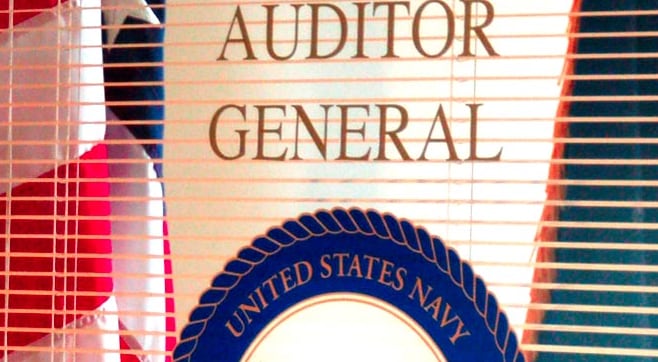For much of this year, then-acting Navy Secretary Thomas Harker defended a proposal to cut the staff and mission of the Naval Audit Service as a way to save money and eliminate internal oversight redundancies, despite fears that such moves would hinder accountability within the sprawling Department of the Navy.
But an examination conducted by the Institute for Defense Analyses, a nonprofit corporation that administers three federally funded research and development centers, found that reducing or eliminating audit offices in each of the services by 50 to 75 percent was “not justified relative to the risk or savings.” Such a move would result in “increased risk to Service mission and goals” while reducing oversight and accountability, according to records released Monday by the House Committee on Oversight and Reform.
For months, members of Congress have requested that Harker produce internal Navy records to justify gutting the Naval Audit Service, which would have seen its team reduced from 290 people to 85 over the next few years.
Harker defended the plan in comments to the press and letters to the lawmakers, contending that the internal oversight entity’s mission overlapped with other oversight offices in the Navy and Defense Department.
But the IDA analysis revealed “no indications of duplication or redundant audits” across such oversight offices and noted that those entities regularly meet to deconflict and eliminate duplication of their efforts.
RELATED

Navy documents released Monday by the committee also show that senior Navy officials discussed the idea of downsizing the audit service as early as May 2020, months before the IDA report was commissioned, and also considered seeking legislation that would have completely eliminated the agency.
Cuts to the audit service were proposed as part of an effort to find extra funds that could go toward shipbuilding.
But lawmakers and auditors who spoke with Navy Times earlier this year have pointed out that the agency’s modest $45 million annual budget is well worth the oversight it provides and is is a small fraction of the service’s overall $207.1 billion budget request for fiscal 2021.
The Navy’s pricey shipbuilding fiascos of recent years, including the littoral combat ship, the Zumwalt-class destroyers and the carrier Gerald R. Ford, have led lawmakers on both sides of the aisle to express skepticism about the service’s ability to handle such programs going forward, adding further need for missions like that of the audit service, advocates said.
In recent years, the Naval Audit Service has reported that overseas personnel were not prepared to respond to a biological, radiological or nuclear incident given the protective equipment on hand.
Auditors also unearthed underperforming technical schools, overpayment of benefits and nearly $5 million in potential fraud in fiscal 2020 alone, according to the most recent annual report.
RELATED

Revelations that internal studies did not justify the audit service cuts came after lawmakers spent months asking Harker to produce records justifying the plans.
Reached by phone Sunday, Harker said the proposed cuts were one of several proposals aimed at freeing up funds for shipbuilding and that he and his staff “were fully engaged” with House members seeking information on the potential cuts.
For now, any effort to slash the audit service appears to be on permanent pause.
A provision in the fiscal 2022 defense policy bill would protect the audit service from any staff or budget reductions until the Navy studies the issue further and reports back to Congress.
In a July 16 memorandum, acting Assistant Secretary of the Navy for Manpower and Reserve Affairs Catherine Kessmeier suspended any audit service “workforce reshaping” efforts that would have moved audit service employees to other Navy departments.
The Navy did not provide that memo to the House Oversight and Armed Services committees until Aug. 5, according to a statement from leadership of those committees.
Despite the revelations and the halting of any future audit service cuts, some damage has already been done, according to the statement.
“Sadly, former Acting Secretary Harker refused for months to adequately justify his proposed cuts before Congress — even as dozens of staffers retired or sought alternative career opportunities — which has likely caused significant and potentially irreversible damage to the Service,” the committees said in the statement.
“We look forward to working with (new Navy Secretary Carlos Del Toro) to right the ship and begin to rebuild the Naval Audit Service so that it can effectively carry out its critical oversight mission on behalf of the United States Navy and American taxpayers,” the committees said.
Geoff is the managing editor of Military Times, but he still loves writing stories. He covered Iraq and Afghanistan extensively and was a reporter at the Chicago Tribune. He welcomes any and all kinds of tips at geoffz@militarytimes.com.





